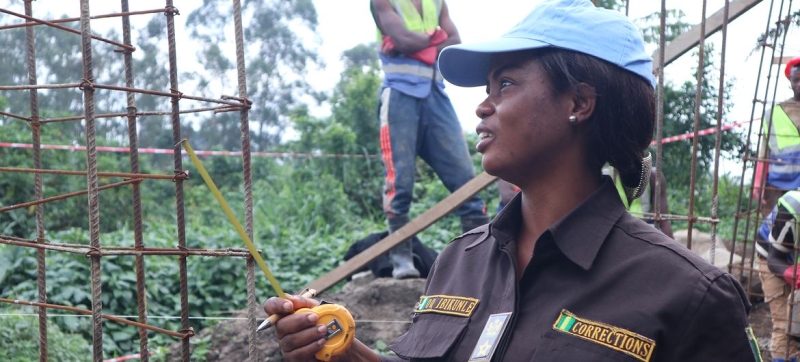
Olukemi Ibikunle is overseeing the construction of a prison in the eastern part of the Democratic Republic of Congo (DRC). UN Trailblazer Award: When the world doesn’t end behind a prison wall Fabrice Robinet Women
This proposal sounded almost like science fiction: the United Nations needed a specialist in the field of prison management – preference was given to a woman – to work with the UN mission in the Democratic Republic of the Congo. Olukemi Ibikunle took a deep breath. The job was perfect for her, but meant separation from her family in Lagos, Nigeria…
38-year-old Kemi, as her family calls her, decided to consult with her family and called home.
“I talked to my husband,” she recalls, “and he said: “Why are you asking? Go! Agree!””
His enthusiasm encouraged Kemi, but she was not sure that he could cope at home alone – with two children aged seven and ten.
Having listened to her concerns, her husband disarmed him with a counter question: “You Do you know the last name of our children? This is my last name. I’ll take care of them.”
Attention to detail
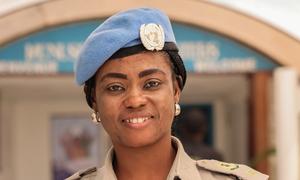
In 2020, Kemi was already, in many ways, an indispensable figure in the Nigerian Prisons Service. A leaking roof, a crack in the wall, a project for a new block – everything went through her. In Lagos State, she oversaw five institutions housing almost nine thousand prisoners. She knew: no glass windows or ceramic sinks that could be broken and the shards used as weapons. The bars are the strongest, allowing enough light to pass through, but impossible to crawl through.
“We are looking for a balance between respect for human dignity and safety,” says Kemi, emphasizing that even in a prison block, the toilet must provide privacy. “We use booths where you can see your legs, but everything else is closed up to the neck, so you can tell if the person is trying to commit suicide.”
“There is no competence floor”
Security and respect for human dignity – this is exactly the balance that the UN required to implement its projects in the Democratic Republic of the Congo. “Competence has no gender,” Kemi emphasizes.
In Kinshasa, the capital of the DRC, Kemi was to be involved in reforming the prison system, which included rethinking the architecture and design of places conclusions.
Reform begins with blueprints
The leadership of the peacekeeping mission convinced the DRC authorities to implement international standards – The Mandela Rules and the UN Bangkok Rules called for humane and gender-sensitive treatment of prisoners, but proposals were met with resistance.
“They didn’t understand why the prison needed a library, a gym or a workshop,” Kemi recalls. Then she changed her approach: she explained that the gym is healthy prisoners, the library is books instead of escape plans.
The arguments, although not immediately, had an effect. The UN team drew up a plan for the construction of new buildings and a list of existing ones, indicating which ones needed to be repaired and which needed to be closed.
Kemi insisted on building separate women’s prisons. “It is not enough to organize a women’s block in a men’s prison,” she argued, arguing that this opens the way to sexual violence. If complete separation cannot be achieved, fences and separate corridors are necessary.
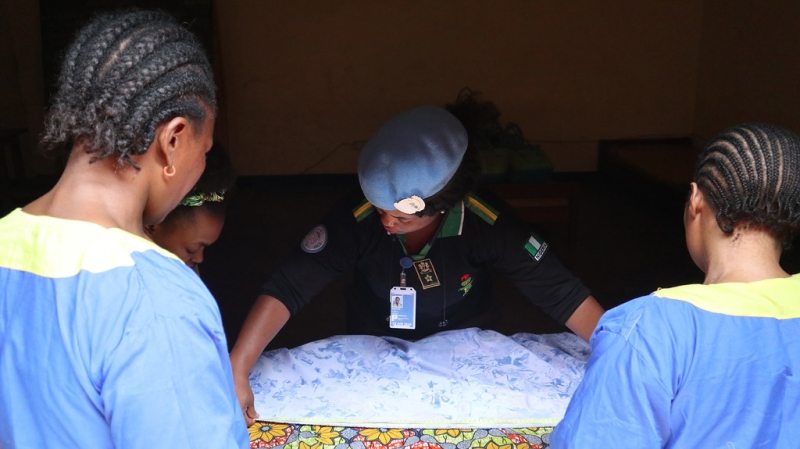
Olukemi Ibikunle organizes a tailoring workshop for female prisoners in eastern DRC.
Breaking stereotypes
While working in the DRC, Kemi repeatedly encountered sexism: some short girl demanded to see checks, checks the strength of reinforcement, asks questions about the sand content in cement?!
Knowing your native dialect and Nigerian English didn’t help much. She learned technical terms in French and learned how to deal with inflated estimates. “This is clearly too much,” she said bluntly. “We will cut the budget.”
Contractors called Kinshasa with complaints, but they were invariably told: “Discuss it with Kemi.”
Vague time
In 2023, Kemi worked in the city of Cabaret, in the province of South Kivu, where she oversaw the construction of a high-security prison with a budget of 850 thousand dollars. The facility implied the presence of dangerous prisoners associated with armed groups.
By that time, the UN mission had already withdrawn the peacekeepers from South Kivu, leaving only a team of prison guards there. When the militants approached the outskirts of the city, Kemi found herself alone.
The evacuation was chaotic. “We left through land corridors, without UN logistics, everyone looked for the way on their own,” she recalls.
Lake Kivu was under the control of the M23 and the waterway through it was closed. She managed to leave the danger zone with a backpack on her shoulders, along with two fellow human rights activists – just hours before the city fell.
A concerned husband wrote to her on WhatsApp: “Where are you? Everything is fine?” She answered evasively: “Everything is fine.” Only now she admits that it was scary: “We who managed to get out are now like one family.”
At the border with Rwanda, her documents aroused suspicion. “You’re from the police,” they told her. Kemi said she was from the prison service. “It’s the same thing,” the border guards insisted.
She was detained, then they called somewhere, checked something for a long time – and in the end they let her through.
Now she works in the city of Beni, in North Kivu, over which the DRC government retains control. The project in Cabaret is frozen.
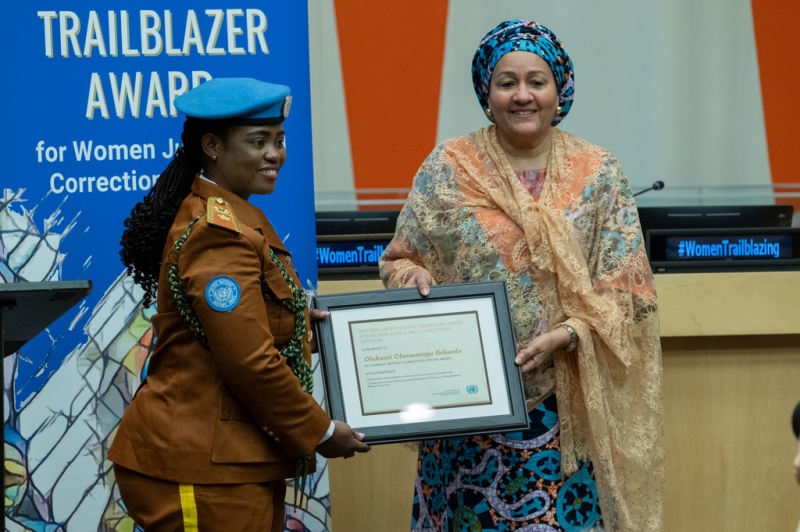
UN Deputy Secretary-General Amina Mohammed presents Olukemi Ibikunle with the Trailblazer Award.
“Pioneer”
This week, Kemi received the UN Trailblazer Award, recognizing women who are “changing the face of justice” and making a difference in reforming prison services. This Wednesday she received the award at the UN headquarters in New York, where she has already become a local celebrity. On the way to the interview, a UN security guard, himself originally from Nigeria, recognized her and came up to congratulate her.
Uvira: fuel from waste
Kemi’s most vivid memories are not about the war, but about projects that change everyday life. One of them is especially dear to her: the biogas system launched in 2021 at the Uvira prison. Human waste is converted into gas for cooking. The forest is no longer cut down for firewood. The sewerage works without interruption. “And no more smell,” she emphasizes.
Guards and prisoners were trained to operate the new system. After the UN peacekeeping mission left, water supplies stopped and a well was drilled. In 2024, Kemi drove eight hours to make sure everything was working. The prison staff said, “This is the best thing you have done for us.”
Women of Bukavu
Another vivid memory Kemi is connected with a prison in the city of Bukavu, where 80 women and more than 1,400 men were kept. Every morning, male prisoners received their legal rations, while women received nothing. The prison management explained this by saying that the women received parcels of food from their relatives, and in addition, they received something from charitable organizations. Why else spend money from the prison budget?
The kitchen was a sad sight: soot on the walls, broken stoves, women cooking their food on the same coal burner for all of them. Kemi didn’t like this: she found two thousand dollars from the meager prison budget, bought dishes, hired technicians and stood by, watching the work until the kitchen came to life.
The main obstacle was bureaucracy. Kemi argued to the prison warden that food was provided to all prisoners, not just men. For two weeks in a row, she came at seven in the morning and oversaw the distribution of food – until fairness became the norm: women received food equally with men. yard.
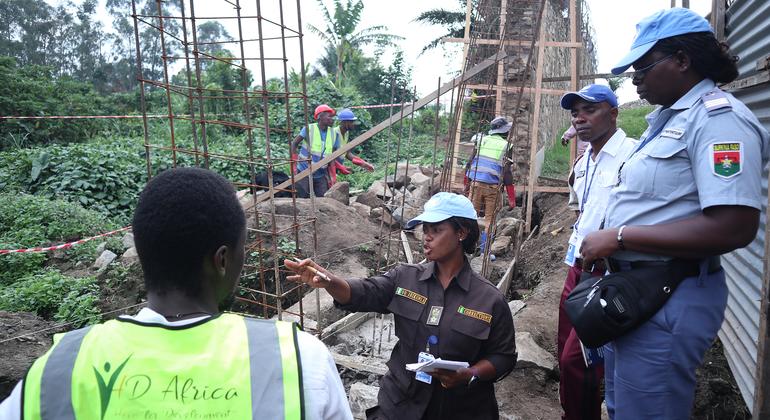
The price of separation
During her business trips, Kemi never forgets about her family – she communicates with her husband and children phone.
“We talk on WhatsApp,” she says. – Children always call on the way to school. When I flew here [to New York – approx. ed.], there was Wi-Fi on the plane, so I could talk to them there too.”
When Kemi first left Nigeria for the Congo, her seven-year-old son behaved with ostentatious indifference: “You’re leaving tomorrow? Okay, see you.” The eldest daughter hugged her and asked her to stay “for five more minutes.”
After the chaos of evacuation from the DRC, the boy – now a teenager – cries every time his mother prepares to leave again: “Don’t leave. You don’t have to work. Dad will take care of us.”
In response, she assures: “It’s not just about the money. I do this for me—and for all of us.”
This Wednesday in New York City, Kemi took the stage to accept the Trailblazer Award. A few solemn minutes – applause, a photo session, congratulations… And then she will return to the work routine: drawing up drawings, filling out forms, morning checks – and a long, persistent struggle to prove that the world does not end behind the prison wall.
